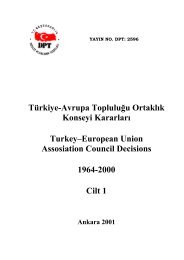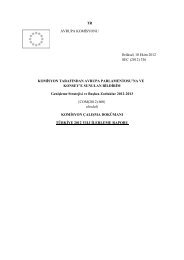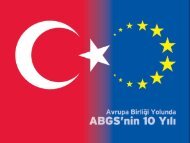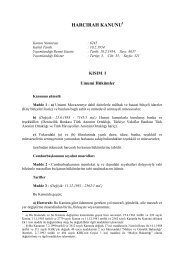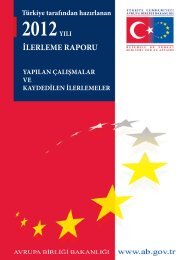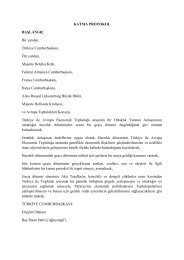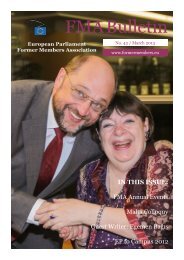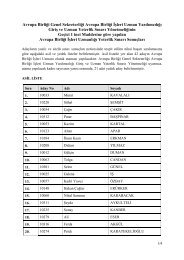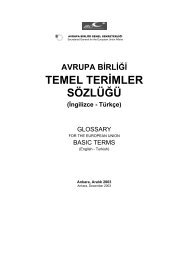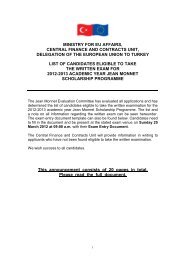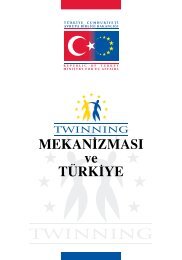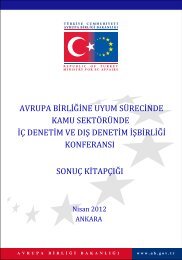2010 ilerleme raporu - Avrupa BirliÄi BakanlıÄı
2010 ilerleme raporu - Avrupa BirliÄi BakanlıÄı
2010 ilerleme raporu - Avrupa BirliÄi BakanlıÄı
You also want an ePaper? Increase the reach of your titles
YUMPU automatically turns print PDFs into web optimized ePapers that Google loves.
e given an opportunity to contact the UNHCR at their request; access to legal counsel is<br />
given provided that illegal migrants cover the costs themselves.<br />
Foreigners who are irregular migrants and victims of trafficking may benefit from free health<br />
services since the directorate general for social solidarity and assistance in the Prime<br />
Minister’s Office issued a circular in May 2009 to the Social Solidarity and Assistance<br />
Foundation. Furthermore, the task force for asylum and migration is preparing a<br />
comprehensive revision of the law on foreigners, in close consultation with the IOM and the<br />
UNHCR.<br />
The full implementation of the newly established circulars, and the rapid adoption of this<br />
legislation under preparation, is a key priority in view in particular to establish fair procedures<br />
for the detention and removal of irregular migrants, and to enhance their reception conditions.<br />
This is also very important to address the judgment issued by the European Court of Human<br />
Rights (ECtHR) in particular on the following two cases related to Turkey : the judgement in<br />
Abdolkhani and Karimnia v Turkey and Z.N.S. v Turkey, where the Court found that the<br />
detention and deportation of irregular migrants to their country of origin, due to the absence<br />
of clear provisions for ordering and extending detention, the lack of notification of the reasons<br />
for detention and the absence of any judicial remedy to the decision on detention were in<br />
breach of the European Convention on Human Rights; and to the judgment in Charahili v<br />
Turkey, where the Court concluded that the applicant’s conditions of detention amounted to a<br />
violation of Article 3 of the European Convention on Human Rights, prohibiting torture.<br />
Consultation of civil society, international organisations and academia is also crucial. Turkey<br />
needs also to draw on the expertise in joint cooperation projects ongoing in this field provided<br />
particularly by the EU. Work is also being done in view of enhancing the administrative<br />
capacities of Turkey to prevent irregular migration and deal with its consequences. A<br />
coordination board for combating illegal migration was established in February <strong>2010</strong> to<br />
identify measures to fight irregular migration, strengthen inter-institutional cooperation and<br />
coordination and monitor operational activity. The board is chaired by the Deputy<br />
Undersecretary of the Ministry of the Interior and meets every two months. Members are the<br />
Chief of General Staff, the Land Forces, the Ministry of Foreign Affairs, the TNP, the<br />
Gendarmerie General Command and the Coast Guards.<br />
The General Directorate for Security issued a circular in September <strong>2010</strong> which provides that<br />
each illegal migrant apprehended will be accommodated in a removal centre with the written<br />
permission of the Governor. The circular also introduces a standard notification that makes<br />
clear that all costs during the stay in a removal centre will be borne by the state. The right to<br />
contact a lawyer is also made clear. Additionally the notification explicitly states the right to<br />
appeal against the decision of deportation and the administrative custody.<br />
Efforts to increase the capacity to host irregular migrants in accordance with international<br />
standards, pending the completion of their removal procedures, continue: while, as of August<br />
<strong>2010</strong>, the current hosting capacity stands at 2,875; the construction/refurbishment/equipment<br />
through national funds of four removal centres (Bitlis, Van, Aydın and Edirne), with a<br />
capacity of 650 persons each, is ongoing. In addition, the establishment through EU-financed<br />
projects of two additional removal centres in Ankara and Erzurum, with a capacity of 750<br />
persons each, is under preparation.<br />
Awareness raising among administrators, governors, district governors, municipalities and the<br />
public at large on the rights of irregular migrants and procedures involved in migration<br />
management is a key issue to be addressed through concrete measures.<br />
EN 81 EN




